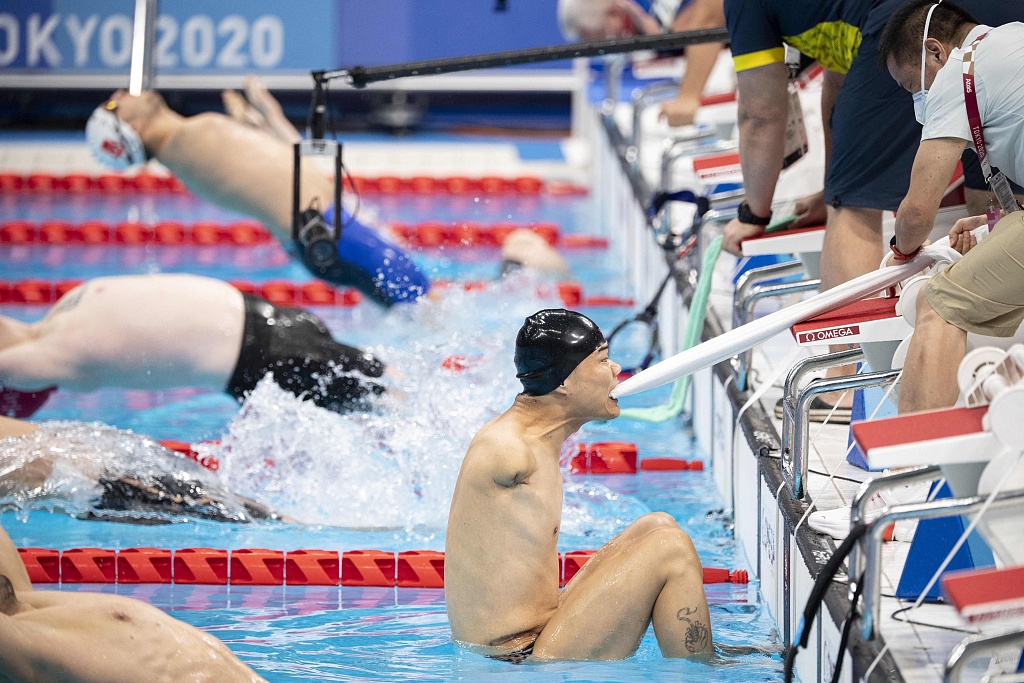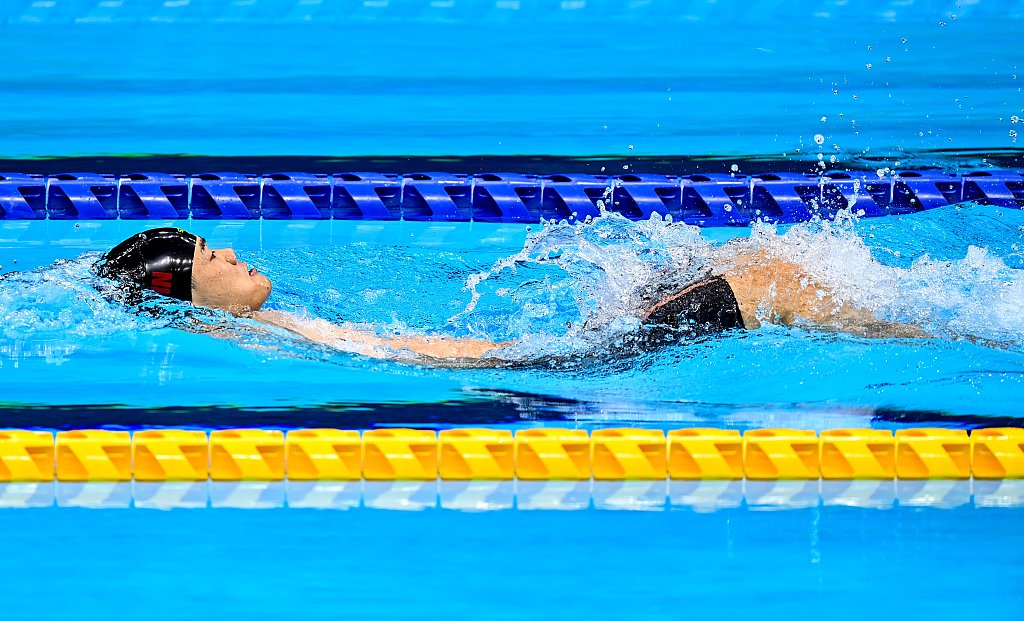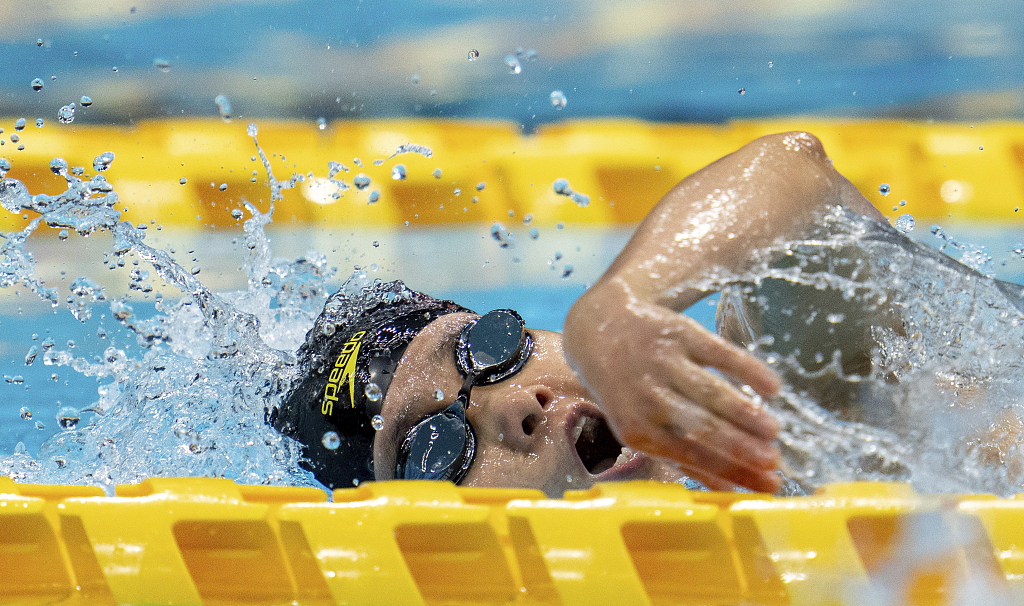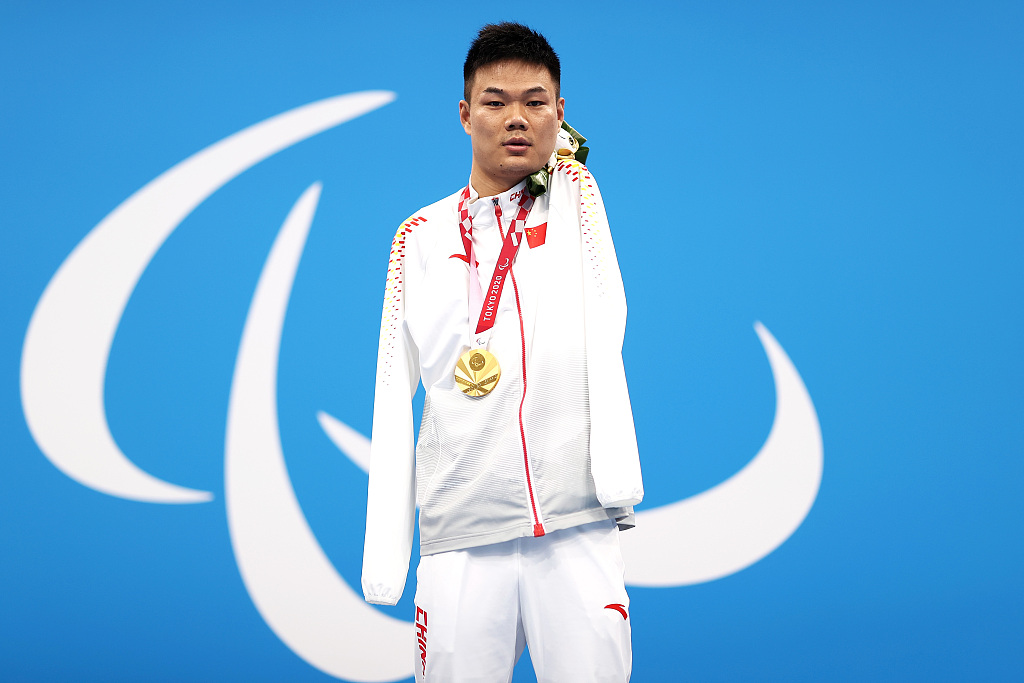
Zheng Tao (C) of China competes in the men's 50m backstroke S5 event at the Tokyo Paralympics at Tokyo Aquatics Centre in Tokyo, Japan, August 30, 2021. /CFP
Zheng Tao (C) of China competes in the men's 50m backstroke S5 event at the Tokyo Paralympics at Tokyo Aquatics Centre in Tokyo, Japan, August 30, 2021. /CFP
The name of Zheng Tao got etched in the world's memory after the Chinese swimmer broke three world records and won four gold medals at the Tokyo Paralympics. But another man's name should also be revealed behind 31-year-old Zheng's incredible performance: coach Zhang Honghu.
Zhang was always there holding the sheet that Zheng held in his mouth before propelling himself in the pool. That job is actually more difficult than it appears.
"If you hold it too low, he can't jump high enough; if you hold it too high, he can't pull full strength," 61-year-old Zhang told Beijing Youth Daily.

Zheng Tao of China competes in the men's 50m backstroke S5 final at the Tokyo Paralympics at Tokyo Aquatics Centre, August 30, 2021. /CFP
Zheng Tao of China competes in the men's 50m backstroke S5 final at the Tokyo Paralympics at Tokyo Aquatics Centre, August 30, 2021. /CFP
When asked why it must be him to hold the sheet for Zheng, Zhang did not tell a story of how the two went through so much together or anything like that. Instead, he simply said: "Maybe I always bring him good luck."
However, Zhang did not hold himself back in praising Zheng: "Team China needs a victory to start the swimming competitions at the Paralympics and it's all on Zheng Tao to do that. He never let us down in the three Paralympics before. … He always keeps a low-profile attitude. If he was more talkative, he would have been much more famous."
China sent 32 swimmers to the Tokyo Paralympics, only half of the number for Rio 2016, but that did not keep them from dominating the events. Team China claimed 19 gold, 19 silver and 18 bronze medals.
Zhang has attended eight editions of the Paralympic Games from 1992 to 2021, witnessing every stage and cornerstone of the development of Chinese Paralympic swimming. He became a coach for Paralympians in 1988 after realizing how much swimming could help the physically challenged.

Li Guizhi of China competes in the women's 100m freestyle S11 final at the Tokyo Paralympics at Tokyo Aquatics Centre, September 3, 2021. /CFP
Li Guizhi of China competes in the women's 100m freestyle S11 final at the Tokyo Paralympics at Tokyo Aquatics Centre, September 3, 2021. /CFP
"We had to do everything under limited conditions at the beginning. Back then, Paralympians were considered as amateur athletes and did not receive enough attention. We only had a loose organization and not any systematic mechanism," Zhang told Beijing Youth Daily.
Paralympic swimming went though dramatic changes in the following decades. Zhang believes the biggest difference is that more schools offering special education to people with disabilities were opened, thereby helping the team find talents more efficiently as well as helping the physically challenged realize that they have more options than just becoming an athlete.
However, according to Zhang, many today still chose to become athletes because they want to surpass their physical limits – they have a simpler but purer goal.

Zheng Tao of China poses with his gold medal after winning the men's 50m butterfly S5 final at the Tokyo Paralympics at Tokyo Aquatics Centre, August 27, 2021. /CFP
Zheng Tao of China poses with his gold medal after winning the men's 50m butterfly S5 final at the Tokyo Paralympics at Tokyo Aquatics Centre, August 27, 2021. /CFP
Zhang also recalled that Zheng wanted to swim because he "did not want to become a useless man." Having become one of the best Paralympic swimmers in the world, Zheng already set a decent example for countless youngsters. He once said after winning a title: "I want to tell my daughter, 'Look, your dad can swim so fast even without arms.'"
Zhang believes that sports can help people grow mentally, especially those with impairments. That's why medals and victories are not as important as self-respect, confidence and the ability Paralympians acquire to get integrated in the society.
"Everything they learn from the competitions can be helpful when they are dealing with their lives. After retiring from sports, these people can live on with a stronger mind and more peaceful attitude," said Zhang.

